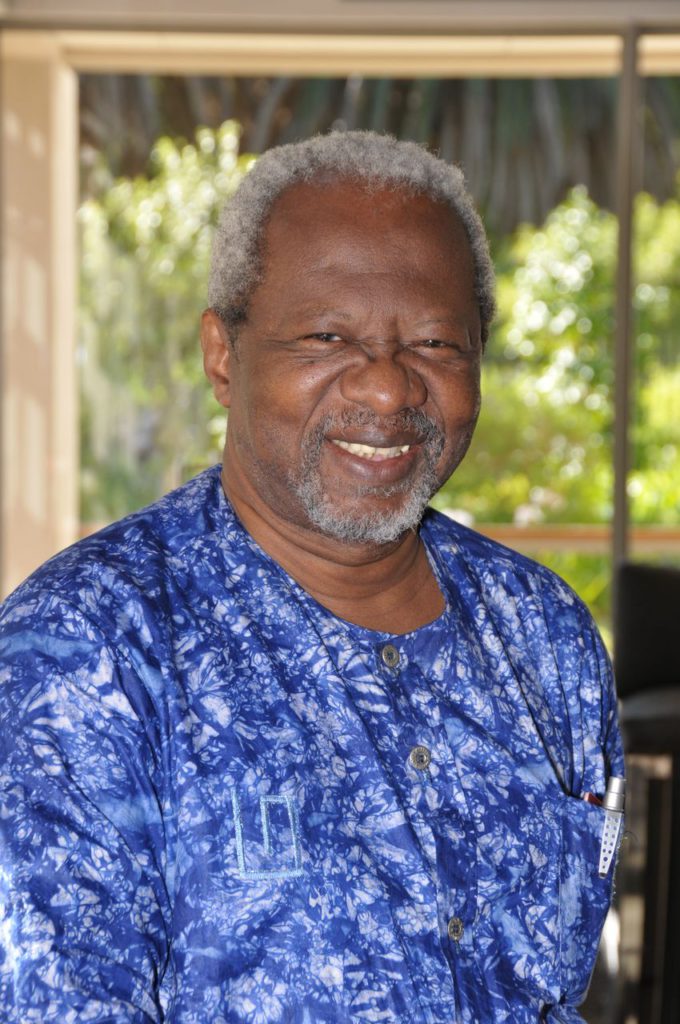News of the passing of Paulin Hountondji on Friday, 2 February sent shock waves among scholars on the continent and elsewhere. Hountondji is remembered as a STIAS Fellow. He was last at STIAS in 2012 where he shared space and ideas with other Fellows at the time including Njabulo Ndebele, Andrew Macnab and Kogila Moodley. At STIAS, the passing of this great philosopher hit even harder as we were reaching out to him to consider another residency.

In a STIAS interview, the Chairperson of the STIAS Academic Advisory Committee and Professor of Social Anthropology at the University of Cape Town, Francis Nyamnjoh reflects on the scholarly prowess of and his final interaction with Hountondji:
STIAS: How did you know Prof Hountondji?
Nyamnjoh: I was honoured to meet, get to know and work with Paulin, when I served as Director of Publications and Dissemination at the Council for the Development of Social Science Research in Africa (CODESRIA) from 2003-2009. Paulin served as vice-president of the Executive Committee for some of that time, and some of his books by CODESRIA were published then. I was fortunate to continue my conversations with him, when I joined the University of Cape Town (UCT) in 2009, where Paulin was invited by the Research Office for public lectures. In 2012, he invited me to a colloquium in Porto-Novo, Benin. Recently, he was featured in an online launch of one of his books by the Humanities Institute (HUMA) at UCT.
On Tuesday, 30 January, a couple of days before his death, he sent me a text via WhatsApp, apologising why he never got to meet my colleague, whom I had sent to greet him.
STIAS: What kind of person was he as a scholar and generally?
Nyamnjoh: Professor Hountondji was a renowned philosopher and required reading when I did my first combined degree in philosophy, psychology and sociology at the University of Yaounde in the early 1980s. We were drawn to his contributions to the debates at the time (still ongoing in some circles) on the extent to which it made sense to speak of African philosophy, and how this could be distinguished from philosophy in general. I particularly remember the richness of his heated exchanges with his contemporary, Marcien Towa, a Cameroonian philosopher, who was more sympathetic to the idea of African philosophy or what some have called “ethnophilosophy”.
Paulin was the most unassuming person and scholar. He used his lucid and incisive mind to highlight struggles for meaning in contexts of extraversion that he shared with others across Africa and beyond. He had a disarmingly pleasant personality. He was a towering and generous intellectual who never turned down an invitation to share ideas, if he could help it.
STIAS: What will you miss about him?
Nyamnjoh: His warmth of character and our joking relationship. He had a self-deprecating sense of humour that demonstrated his determination not to allow the fact of his stutters to stand in the way of his message. He would sometimes start a meeting or speech in stutters, but with humour: « Mesdames et Messieurs, permettez-moi de vous bégayer quelques mots. » (“Ladies and gentlemen, let me stutter a few words to you.”).
Above all, I will miss his intellectual generosity. His capacity to reach out to, cultivate and foster academic ambitions and dedication to excellence in knowledge production among the younger generation, is an unparalleled gift. It also ensures that he defies death and dying. So, I am sure to continue my conversations with him through his works and illustrious acts of compassion.
STIAS Director, Edward K Kirumira said Hountondji was a scholar consistent in his conviction of a dialogical discourse in the search and upholding of a philosophy that underscores the exploration into the nature and challenges of intellectual activity in Africa and the developing world. His project as a STIAS Fellow in 2012 was aptly titled ‘Beyond extraversion: Ways towards intellectual self-reliance’. He will be remembered warmly.
